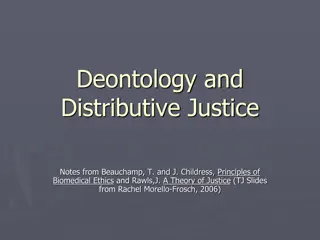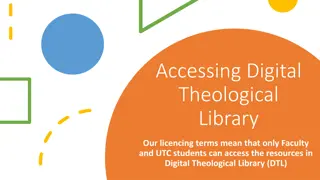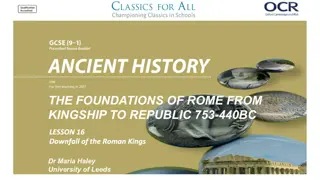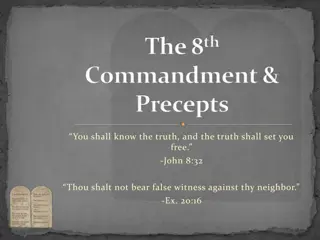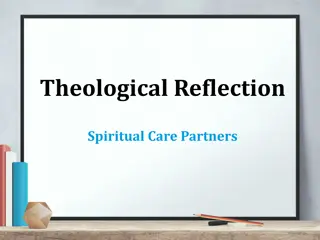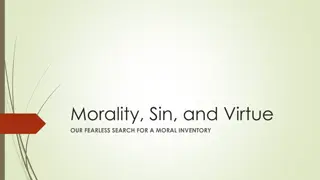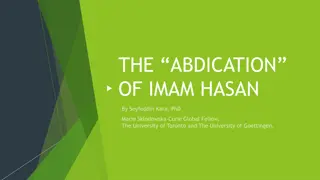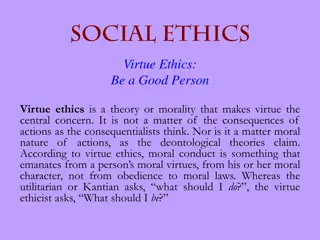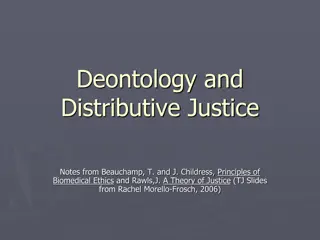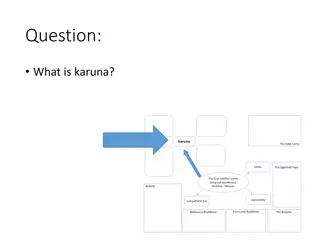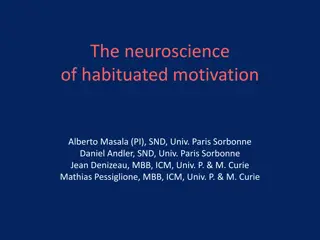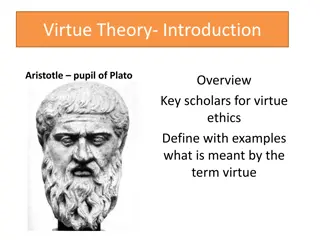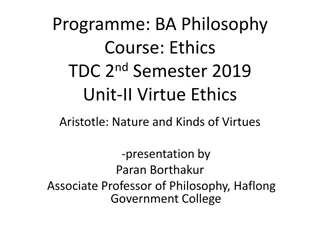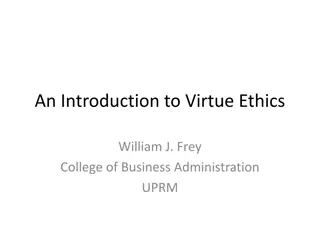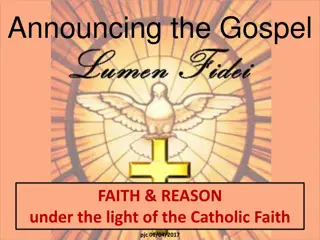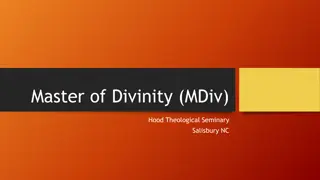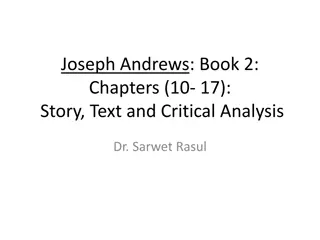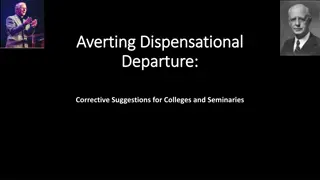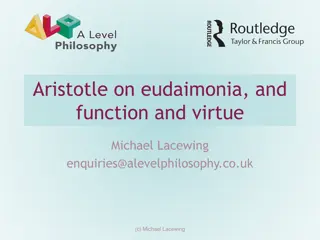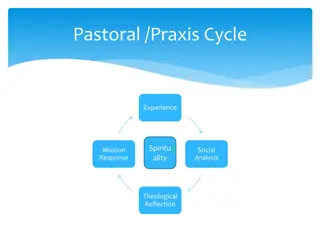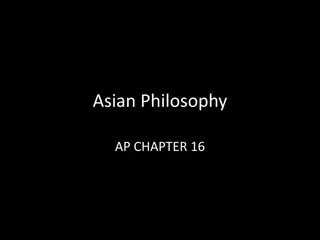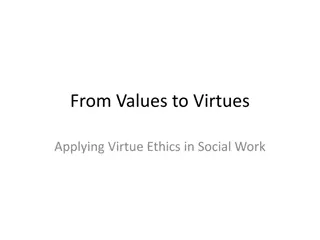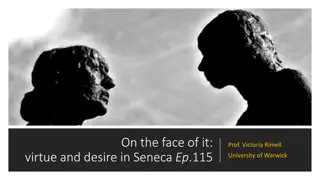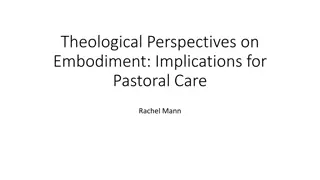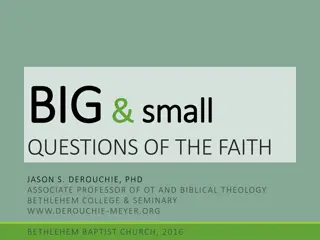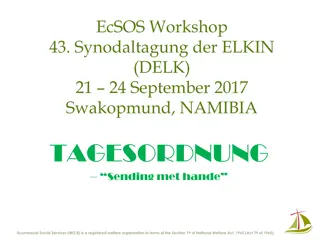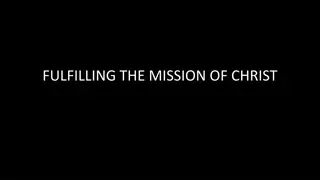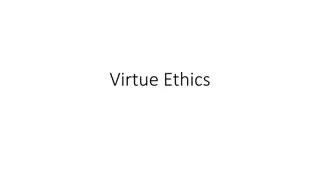Understanding Deontology and Distributive Justice in Ethics
Deontology, originating from the Greek words for duty and study of, focuses on morally required, forbidden, or permitted choices. It emphasizes obedience to duty and opposes utilitarianism, prioritizing what is morally right over the overall good. Unlike virtue theories, deontology assesses moral ob
2 views • 32 slides
Understanding Human Values, Ethics, and Ethical Frameworks
Human values and ethics play a crucial role in guiding individual behavior and decision-making. Human values encompass aspects such as respect, integrity, responsibility, fairness, compassion, honesty, trustworthiness, and cooperation. Ethics provide broader guidelines for determining right and wron
3 views • 7 slides
Accessing Digital Theological Library: Guide for Students and Faculty
Learn how to access resources in the Digital Theological Library (DTL) for Faculty and UTC students. Follow the step-by-step instructions to search for topics, request access to DTL2, and navigate the authentication process to access eBooks effectively.
0 views • 16 slides
The Downfall of the Roman Kings: Lucretia's Role in Establishing the Republic
The Rape of Lucretia by Sextus Tarquinius was a key event leading to the downfall of the Roman kings and the establishment of the Republic. Lucretia's character, representing chastity and virtue, inspired Brutus to take a stand against the tyrannical rulers. Brutus's impassioned speech and vow marke
2 views • 6 slides
Ancient Greek Conceptions of Citizenship by Aristotle
Ancient Greek conceptions of citizenship, as discussed by Aristotle, emphasized the close-knit nature of city-states, where citizenship was a bond forged by active participation in public affairs. Citizenship was viewed as a privilege, exclusive in nature, with a strong emphasis on civic virtue, tru
0 views • 9 slides
The Importance of Truth in Life and Faith
The significance of truth, as reflected in the 8th Commandment and precepts, emphasizes the relationship between truthfulness and divine principles. From understanding what truth entails to witnessing to truth in life, this content delves into the essence of truth as a guiding virtue in both persona
0 views • 20 slides
A Mother's Tale: Night of the Scorpion by Nissim Ezekiel
One fateful night, a scorpion stings a mother, bringing together rationality and faith, rural life, superstitions, virtue, vice, and the undying love of a family. As the villagers seek remedies, the struggle between science and belief unfolds, ultimately leading to a poetic resolution of gratitude a
0 views • 7 slides
Understanding Chastity: Exploring Its Meaning and Significance
Delve into the concept of chastity and its importance in Islamic ethics. Explore various aspects such as identifying different kinds of chastity, methods to maintain chastity, and analyzing its impact on society. Engage in activities and discussions to deepen your understanding of this valuable virt
1 views • 19 slides
Ethical Studies Course Overview and Activities
Delve into the world of Ethical Studies with this comprehensive course overview. Explore themes like Ethical Language and Thought, Natural Law, Situation Ethics, and more. Engage in activities like Virtue Ethics starters, fortune line graphs, and discussions on moral dilemmas. Dive into the principl
0 views • 17 slides
Theological Reflection and Spiritual Care Partners
Explore the essence of theological reflection, its connection to faith and action, and how it illuminates our experiences in light of the Gospel mysteries. Reflect on the parables of Jesus, the profound questions of existence, and the deep significance of living a purposeful life aligned with faith
0 views • 20 slides
Exploring Morality, Sin, and Virtue: A Journey of Self-Discovery
Dive into the profound exploration of morality, sin, and virtue, uncovering the essence of self-reflection and ethical understanding. From delving into the definitions of these concepts to understanding the nature of sin and virtue, embark on a transformative path towards enlightenment and inner gro
1 views • 22 slides
Introduction to ABA, Ethics, & Core Principles: A Paradigm Overview
This chapter provides a historical context of approaches to ethical behavior in behavior analysis. It discusses theoretical conflicts, the importance of consequences, and reviews dominant paradigms in clinical ethics such as virtue ethics, consequentialism, and deontology. It explores the concept of
0 views • 38 slides
Exploring Roots of Goodness and Virtue in Words
Delve into the roots "ben", "bene", and "bon" that signify goodness, learn about inheritances and benevolent individuals, discover terms for authenticity and exceeding expectations, and find words describing favorable outcomes and altruistic actions. Uncover the essence of kindness, generosity, and
0 views • 24 slides
The Abdication of Imam Hasan and the Theological Dilemma
The abdication of Imam Hasan refers to his renunciation of the caliphate in favor of Muawiya, sparking theological trauma and debate within the Shi'i community. This decision, contrary to his lineage and perceived duty, led to questions about divine leadership and the nature of political power. Diff
1 views • 14 slides
Understanding Virtue Ethics in Aristotle's Philosophy
Virtue ethics places virtue at the center of morality, emphasizing moral character over obeying laws or focusing on consequences. Aristotle's influence on virtue ethics is significant, highlighting the importance of striving to be a virtuous person whose actions stem from a virtuous character. Accor
6 views • 24 slides
Deontology and Distributive Justice in Ethics
Deontology, rooted in the concept of duty, focuses on morally required, forbidden, or permitted choices. It emphasizes obedience to duty, opposing utilitarian claims. Unlike virtue theories, deontology prioritizes what is right over an overall conception of good. Immanuel Kant's categorical imperati
0 views • 32 slides
Understanding Human Values, Ethics, and Ethical Frameworks
Human values and ethics play crucial roles in guiding human behavior and decision-making. Values such as respect, integrity, responsibility, fairness, compassion, honesty, trustworthiness, and cooperation are fundamental in shaping individual interactions with others and society. Ethics provide broa
1 views • 7 slides
Understanding Karuna in Buddhist Philosophy
Karuna, a key virtue in Mahayana Buddhism, emphasizes recognizing and alleviating the suffering of others. Bodhisattvas exemplify this virtue through selflessness, while figures like Amitabha Buddha embody compassion through acts like welcoming believers to Sukhavati. The concept of karuna is closel
0 views • 14 slides
Understanding the Neuroscience of Habituated Motivation in Virtue Cultivation
Exploring the intersection of Aristotelian theory, cognitive neuroscience, and moral philosophy, this research delves into the conditions and mechanisms underlying the cultivation of virtuous habits through apprenticeship. By leveraging diverse expertise in philosophy, neuroscience, and cognitive sc
2 views • 21 slides
Ethical Theories: Divine Command vs. Virtue Theory Explained
Divine Command Theory asserts that morality is derived from God's commands, contrasting with Virtue Theory which focuses on developing moral virtues to achieve human flourishing and excellence. Divine Command Theory relies on religious texts, while Virtue Theory emphasizes the cultivation of virtues
0 views • 24 slides
Understanding Virtue Ethics and Aristotle's Virtue Theory
Delve into the world of Virtue Ethics with a focus on Aristotle's Virtue Theory, exploring the concept of virtue, key scholars in virtue ethics, and the development of virtues. Discover the Golden Mean, Eudaimonia, and the Beatitudes in relation to virtue theory, alongside discussions on moral decis
0 views • 21 slides
Aristotle's Virtue Ethics: The Nature and Kinds of Virtues
Aristotle's virtue ethics discusses the nature of virtues as a disposition unique to humans that enables them to function well according to reason. Virtue involves finding the mean between excess and deficiency, not endorsing mediocrity. It emphasizes that virtues are acquired through habitual pract
1 views • 18 slides
Exploring Virtue Ethics and Human Flourishing
Delve into the realm of virtue ethics, uncovering the significance of moral education, self-excellence, and rethinking traditional moral theories. Learn how virtues shape our actions, character, and perception of ethical dilemmas, ultimately leading to human fulfillment and happiness.
1 views • 21 slides
Exploring the Relationship Between Faith and Reason in Catholic Beliefs
Understanding the theological virtue of faith and the capacity for reasoning in the context of Catholic teachings. Explore the tension between faith and reason, and the differing perspectives from secular critics and faith-based individuals on the role of faith and reason in society.
0 views • 19 slides
Exploring Civic Virtue and Institutional Design in Early Modern Governance
Delve into the complexities of civic virtue and institutional design in early modern governance through a 3,000-word essay. Analyze the necessity of civic virtue within the state and consider contrasting perspectives on whether institutional design can replace it. Use primary texts to support your a
0 views • 32 slides
Master of Divinity (MDiv) Program at Hood Theological Seminary
The Master of Divinity (MDiv) program at Hood Theological Seminary in Salisbury, NC, offers a comprehensive curriculum focused on biblical studies, history of Christianity, theology and ethics, and pastoral theology. With a duration of 84 credit hours, students delve into interpreting biblical texts
0 views • 18 slides
Analysis of Selfishness and Virtue in Chapters 10-11 of Joseph Andrews
The text from Chapter 10 of Joseph Andrews explores themes of selfishness, materialism, and virtue as a group confronts the aftermath of an adventure. The characters argue over their shares of an 80-pound reward, revealing their self-serving nature. The chapter delves into the motivations and action
0 views • 41 slides
Averting Dispensational Departure: Corrective Measures for Theological Institutions
A comprehensive study explores the departure of graduates from dispensational institutions, analyzing influences, alumni perceptions, and proposing recommendations to prevent theological departures. The research highlights key findings and phases of the study, shedding light on solidly dispensationa
0 views • 24 slides
Understanding Aristotle's Concept of Eudaimonia and Virtue
Aristotle's philosophy delves into the concept of eudaimonia, which is not mere pleasure or wealth but the state of living well and flourishing. Eudaimonia is achieved through the exercise of virtues, qualities that aid in fulfilling one's function or characteristic activity. This pursuit of eudaimo
0 views • 10 slides
Exploring Pastoral Praxis and Theological Reflection in Social Analysis
Dive into the interconnected realms of pastoral praxis, philosophical and pedagogical roots, theological connections, social analysis, and missiological reflections, emphasizing the transformative power of contextual understanding and action. Engage with critical theories, Freire's educational model
0 views • 11 slides
Understanding Confucius: Key Concepts and Philosophical Ideals
Confucius, born during the Zhou Dynasty, emphasized virtue, social reform, and humanism in his teachings. He focused on values like Ren (human-heartedness) and key concepts such as De (virtue) and Li (propriety). By studying human practices, he sought to achieve goodness and harmony. Explore the phi
0 views • 23 slides
Applying Virtue Ethics in Social Work: From Values to Virtues
Exploring the application of virtue ethics in social work, this content delves into the transition from foundational values to virtuous character traits. It discusses the importance of moral qualities, virtues, and practical wisdom in making ethically informed decisions. Highlighted are the perspect
0 views • 14 slides
Virtue Ethics in Bigelow's Films: A Moral Exploration
The discussion delves into the virtue ethics portrayed in Kathryn Bigelow's films "The Hurt Locker" and "Zero Dark Thirty." It raises questions on the ethics of actions taken in the war on terror, particularly the controversy surrounding the depiction of torture as crucial in the killing of Bin Lade
0 views • 12 slides
Exploring Virtue and Desire in Seneca's Philosophy
Seneca presents a nuanced version of Stoicism, allowing for human interaction and love while emphasizing the purity of love separate from bodily desires. Through Seneca's writings, the distinction between love and desire is made clear, touching on themes of body, mind, desire, and veneration. The in
0 views • 15 slides
Theological Perspectives on Embodiment and Pastoral Care
Exploring theological perspectives on embodiment and pastoral care, this content delves into the complexities of the body in Christian thought, discussing topics such as the intersection of power and knowledge in bodies, the fear and fascination with death, and the implications for pastoral care bey
0 views • 9 slides
Understanding Young Earth Creationism: Biblical Perspectives on the Age of the Earth
Exploring the viewpoint of Young Earth Creationism (YEC) based on biblical arguments, this content delves into the belief that God created the earth in six 24-hour periods, making it exceptionally young by conventional scientific standards. The discussion focuses on the biblical passages and theolog
0 views • 20 slides
Workshop on Diakonia: Exploring Theological Foundations and Practical Applications
Delve into the theological foundation of diakonia through the lens of Trinity, Holy Communion, and mission. Learn about the significance of serving tables in Acts 6 and the call to make disciples of all nations in Matthew 28. The workshop aims to revitalize diaconal work within the church and offer
0 views • 17 slides
Unveiling Paul's Ethical Teachings and Theological Foundations
Delve into the ethical teachings of Paul, exploring how they intertwine with his theological thought. Witness the progression of his theology as he shapes the behavior of his communities, using it as a tool to construct and scrutinize the church's actions through the lens of the gospel.
0 views • 25 slides
Insights into Virtue Ethics and Critiques of Kantian Morality by Philippa Foot
Philippa Foot, a key figure in the modern revival of Aristotle's virtue ethics, critiques the Kantian approach to morality. She emphasizes the importance of motivation in cultivating virtues, arguing that feeling bound by morality stems from wanting to lead a flourishing life. Through her works, Foo
0 views • 14 slides
Forms of Moral Reasoning and Ethics in Decision-Making
Explore the main forms of moral reasoning in ethical decision-making, including virtue ethics, deontological reasoning, and teleological reasoning. Understand the importance of developing ethical virtues and principles in guiding behavior. Delve into examples of reasoning from virtue and deontologic
0 views • 28 slides
